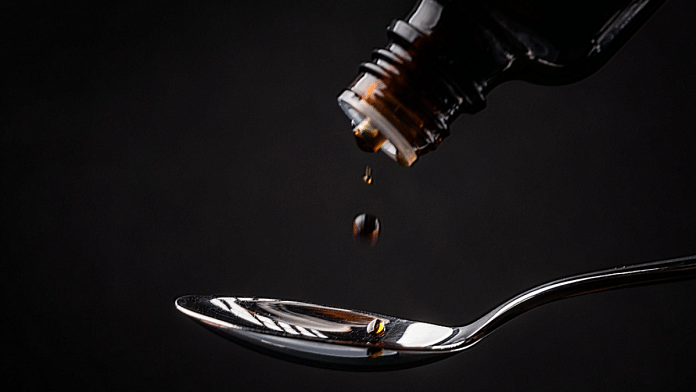New Delhi: An advisory panel to the US Food and Drug Administration (US FDA) has said that phenylephrine, an ingredient used in many common cold drugs, is ineffective when taken orally — raising the likelihood that the oral formulations using it may be pulled off the shelves in America in the coming months.
The panel report, which was made public Tuesday, also noted that oral phenylephrine is no better than a placebo for relieving nasal congestion, and suggested that it may have been wrongly approved for oral use decades ago.
Phenylephrine is widely used in India as well, in various fixed-dose combinations (FDCs) that contain phenylephrine hydrochloride salt. These FDCs are popular among both adults and children who suffer from cold symptoms.
In India, phenylephrine is widely used in various FDCs that are available as syrups and tablets. These FDCs, such as TusQ-DX (Blue Cross Laboratories), Chericof (Sun Pharma), Ascoril D Plus (Glenmark), Asthakind-DX (Mankind Pharma), Lefrin (Cadila Pharma), are consumed and prescribed to many people who suffer from cough and cold symptoms.
According to health experts, the impact of the US FDA panel’s findings on the Indian market is unclear, and that more evidence and regulatory action may be needed to assess the efficacy and safety of oral phenylephrine. However, some even praised the efforts.
Speaking to ThePrint, Dr Rajeev Jayadevan, a gastroenterologist and clinical researcher from Kerala, called the US FDA panel’s document as a “fine example of critical thinking and self-correction without prejudice, the hallmark of true science”.
“It will be helpful if the same scientific rationale will be used in India, where pills and syrups using phenylephrine are immensely popular,” he told ThePrint.
Dr Santanu Tripathi, a senior clinical pharmacologist who has served on several Central Drugs Standard Control Organisation (CDSCO) panels, said the US FDA panel’s stance on oral phenylephrine is important as it has poor and unreliable oral bioavailability (the proportion of an orally taken drug that reaches the circulation and has an active effect).
“In view of such new development, the CDSCO can probably form an expert group to take a decision in the Indian context,” he suggested.
Moreover, a kinetic study (to examine how a drug is absorbed, distributed, metabolised, and eliminated in the body) can also be commissioned to generate evidence from India, which may provide the rationale for its potential efficacy when taken by mouth, he added.
ThePrint reached Drug Controller General of India (DCGI) Rajeev Singh Raghuvanshi via calls to understand whether the agency may take up the issue for scientific discussions, which went unanswered.
All the pharmaceutical companies mentioned above in this report were also reached out via email for their comments on the US FDA panel’s findings, but none of them responded till the time of publishing this report. This article will be updated once a response is received.
Also Read: Kerala doctors & researchers plan India’s 1st private drug quality assessment drive
Findings of US FDA panel
The US FDA panel spent two days — 11 and 12 September — looking at studies of phenylephrine and said in a briefing document — a copy of which is with ThePrint — that it is “no more effective than a placebo”.
During the two-day meeting, the panel reviewed five studies conducted over the past 20 years, which showed that less than 1 percent of active ingredient (phenylephrine) reached the bloodstream, and that the decongestant was no more effective than a placebo.
The panel also noted that phenylephrine is still effective when used as a nasal spray, but that it is destroyed in the gut when swallowed — making it useless when taken as a tablet, capsule, or syrup.
After a 2007 study by researchers associated with the University of Florida first suggested that phenylephrine, when taken orally, may be ineffective, the US FDA has been reviewing the scientific evidence to weigh its effectiveness.
The panel has now said that the molecule may have been approved wrongly several decades ago for oral use, while also predicting some negative consequences when the oral versions are no longer available — for instance its impact on the drug industry, which may need to rework the formulae for common cold drugs.
Phenylephrine as nasal decongestant
Cold medications with phenylephrine are sold as over-the-counter medications in the US, and there are concerns that drugmakers may now be asked by the US FDA to rework their formulations without phenylephrine.
According to some clinicians, the latest advisory regarding the potential ineffectiveness of orally administered phenylephrine is in line with the medical community’s concerns about this common decongestant.
“While phenylephrine is widely used to alleviate nasal congestion, its efficacy when taken orally remains uncertain,” said Dr Tribhuvan Gulati, lead consultant, diabetes, obesity & internal medicine at the CK Birla Hospital, New Delhi.
The lack of solid data supporting its effectiveness both orally and nasally raises questions about its reliability as a treatment option, he added.
In practice, Dr Gulati added, that many healthcare professionals lean towards alternative treatments, such as nasal sprays with phenylephrine or other decongestants, which offer more relief by targeting nasal passages directly.
“The delayed action and inconsistent outcomes associated with oral phenylephrine make it a less-preferred choice,” he said.
He, however, advised that patients seeking relief from nasal congestion should consult their healthcare providers for personalised guidance on the most effective and evidence-based treatment options.
Dr Manoj Goel, director, pulmonology, Fortis Memorial Research Institute in Gurugram, explained that phenylephrine is a vasodilator and is usually combined with other medications in various cough syrups and tablets.
“Many times, these combinations are not rational also and phenylephrine can, in fact, cause a fall in blood pressure,” he said.
He said that currently, there are much better and safer nasal sprays available for nasal congestion. “Nasal sprays are recommended as the first-line treatment for this condition.”
(Edited by Richa Mishra)
Also Read: After small firms, India’s drug regulator puts big companies supplying to US, EU under scanner



